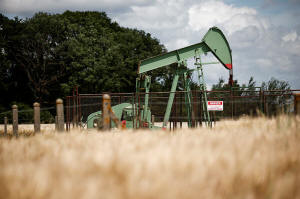Oil prices drop as US recession fears spark broader selloff
 Send a link to a friend
Send a link to a friend
 [August 05, 2024] By
Paul Carsten [August 05, 2024] By
Paul Carsten
London (Reuters) -Oil futures extended losses in a volatile session on
Monday, trailing a stock market selloff sparked by fears of a U.S.
recession, though declines were buffered by worries that spreading
conflict in the Middle East could hit crude supplies.
Share markets tumbled across Asia as U.S. recession fears sent investors
rushing from risk assets while wagering that rapid interest rate cuts
will be needed to drive economic growth.
Brent crude futures dropped $1.07, or 1.4%, to $75.74 a barrel by 1128
GMT, with prices trading around their lowest since January. U.S. West
Texas Intermediate crude was down $1.18, or 1.6%, at $72.34.
U.S. recession concerns stoked by Friday's weak July payrolls report
"only add to Chinese demand concerns that have been lingering in the oil
market for some time", ING analysts led by Warren Patterson said in a
note.
Slumping diesel consumption in China, the world's biggest contributor to
oil demand growth, is also weighing on oil.
The decline in oil prices closely trailed falls in European stock
markets. Germany's DAX, France's CAC 40, Britain's FTSE and Spain's IBEX
35 all lost more than 2%.

But even with the latest selloff, oil has still underperformed many
major stock exchanges in 2024. Since the beginning of the year the
Nasdaq 100 has risen 11% and the FTSE 3%, while Brent crude is down 0.3%
Oil has also been pressured by the decision of the OPEC+ group of
producers to stick to its plan to phase out voluntary output cuts from
October, which means that supplies will rise later this year, analyst
say.
[to top of second column] |

A pumpjack operates at the Vermilion Energy site in Trigueres,
France, June 14, 2024. REUTERS/Benoit Tessier/File Photo

OPEC oil output rose in July despite production cuts by the group, a
Reuters survey showed on Friday.
However, oil losses were capped by geopolitical risks in the Middle
East. Fighting in Gaza continued on Sunday, a day after an
unsuccessful round of ceasefire talks in Cairo.
Israel and the United States are bracing for a serious escalation in
the region after Iran and its allies Hamas and Hezbollah pledged to
retaliate against Israel for the killings of Hamas's leader and a
top Hezbollah military commander last week.
"The risk of a wider regional war, while I still think is small,
can't be ignored," said Sydney-based IG market analyst Tony
Sycamore.
Investors are also awaiting U.S. services data for last month to
gauge the health of the world's largest economy, Sycamore said.
"Another fall tonight and it supports the idea the Fed is behind the
curve," he said, referring to the U.S. central bank's delays to
interest rate cuts.
(Reporting by Paul Carsten in London and Florence Tan in
SingaporeEditing by David Goodman)
[© 2024 Thomson Reuters. All rights
reserved.]
This material may not be
published, broadcast, rewritten or redistributed.
Thompson Reuters is solely responsible for this content.
 |